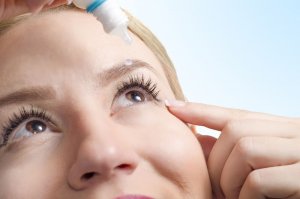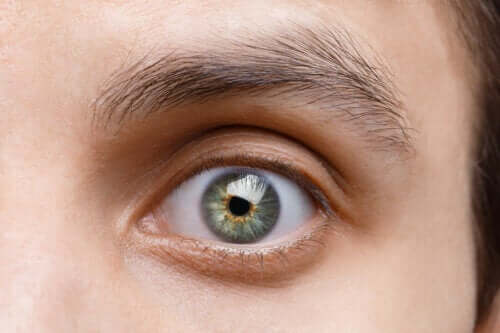Natural Remedies for Dry Eyes

Dry eyes are an annoying problem that causes itching and irritation. While food and water are needed to provide the necessary hydration from within, you can also try some very effective natural solutions.
In today’s article, we’ll share six of the best alternative treatments for dry eyes with you. Not only will they make a big difference, but your eyes will shine a little brighter all day long.
6 Natural Remedies for Dry Eyes

When we suffer from dry eye syndrome, beyond the strong discomfort and the desire for some relief, we usually wonder what can cause it. The National Library of Medicine of the United States points out that the main causes are exposure to the sun or tobacco, the environment (wind, air conditioning, heating…), medications, or the use of contact lenses. So how can dryness be alleviated?
Note: It’s important to consult with your eye care professional before applying any natural remedy to the eyes.
1. Eye Exercises for Dry Eyes
Sometimes, dry eyes can be caused by facial tension, which greatly affects your eyes. Not blinking or being very stiff keeps them from becoming hydrated and correctly lubricated. That said, here are some exercises to fight dry eyes:
- Blink often, especially when in front of a computer screen.
- Every so often, close your eyes tightly and relax them for a few seconds.
- Several times a day, look in all directions without moving your head (up and down, side to side, diagonally).
- From time to time, look at the tip of your nose for a few seconds. This will work the muscles in a way that they rarely perform.
Read also: 5 Things Your Eyes Say about Your Health
2. A Facial Self-massage
Another way to fight facial and eye tension is through self-massage. This will help activate the circulation in your face and add moisture to your eyes.
Here are some ideas for self-massage:
- Press on the bones of your cheeks several times with parallel fingertips.
- Massage your temples in a circular manner.
- Pinch your eyebrows.
- Press gently around your eyes, your eyebrows and cheekbones.
- Stroke your closed eyelids in gentle circles.

3. Ghee or Clarified Butter for Dry Eyes
In Indian Ayurvedic medicine, the application of ghee or clarified butter is recommended to hydrate and nourish the eyes and any other part of the body. No hemos hallado estudios científicos que apoyen esta teoría.
- Apply a drop of ghee in each eye in the morning when you get up.
- Repeat the same thing in the afternoon.
- You will have blurred vision for a few seconds. Soon, however, you’ll notice your eyes are very hydrated and feel healthier.
See also: 6 Tips for Healthy Eyes
4. Flaxseed
Flaxseed and linseed are very effective foods for improving natural tear production. Their high content of omega 3 essential fatty acids is responsible for nourishing the eye from within.
To benefit from these properties, consume flaxseed every day. You can do it in two ways:
- Ground, because they are oxidized very easily due to their high fat content.
- In the form of cold extraction oil by taking a tablespoon (15 ml) daily or as capsules (recommended dose).
- Soaked whole seeds, which can be consumed regularly to promote intestinal transit.
However, if what you want is to assimilate their nutrients, you should consume them in one of the two ways listed above.
 5. Eyebright
5. Eyebright
Eyebright is a medicinal plant for the eyes. This is thanks to its richness in vitamins, minerals, and other nutrients that help:
- Fight conjunctivitis,
- Relieve itching, irritation and eye redness,
- Reduce inflammation and swelling,
- Balance tear production and prevent dry eyes,
- Treat sties and blepharitis.
It’s worth clarifying that we’ve found no scientific research with conclusive data to corroborate any of these uses. In fact, WebMD notes that the results to date are insufficient.
The best way to use eyebright is by applying it in the form of eye drops. These can be based on the active principles of the plant or homeopathic in nature. If you prefer to apply this through compresses, make sure that everything you use is well sterilized.
6-Seawater for Dry Eyes
One of the most widespread practices today is to use seawater as a homemade eye drop. Those who use it claim that, if diluted correctly, seawater would have antiseptic and decongestant properties that would respect the delicate nature of the eye.
The truth is that an article published in Scientific African Magazine states that this practice can be extremely dangerous for the eyes and its use is not recommended. For this reason, it is recommended to consult a doctor before using it.
Consultating with an eye specialist is the most advisable thing to do
Although it’s possible to find all kinds of recommendations online to improve dry eyes, the truth is that consultating with a specialist doctor is the best option to obtain a proper diagnosis and treatment.
Keep in mind that natural remedies can also cause allergic reactions. So, before starting the use of any of the topical options included in this article, we recommend professional consultation.
All cited sources were thoroughly reviewed by our team to ensure their quality, reliability, currency, and validity. The bibliography of this article was considered reliable and of academic or scientific accuracy.
- Paduch, R., Woźniak, A., Niedziela, P., & Rejdak, R. (2014). Assessment of eyebright (euphrasia officinalis L.) extract activity in relation to human corneal cells using in vitro tests. Balkan medical journal, 31(1), 29-36.
https://www.ncbi.nlm.nih.gov/pmc/articles/PMC4115993/ - Mohd Nani, S. Z., Majid, F. A., Jaafar, A. B., Mahdzir, A., & Musa, M. N. (2016). Potential Health Benefits of Deep Sea Water: A Review. Evidence-based complementary and alternative medicine : eCAM, 2016, 6520475.
https://www.ncbi.nlm.nih.gov/pmc/articles/PMC5221345/ - Rasmussen, H. M., & Johnson, E. J. (2013). Nutrients for the aging eye. Clinical interventions in aging, 8, 741-8.
https://www.ncbi.nlm.nih.gov/pmc/articles/PMC3693724/ - Javadi, M. A., & Feizi, S. (2011). Dry eye syndrome. Journal of ophthalmic & vision research, 6(3), 192-8.
https://www.ncbi.nlm.nih.gov/pmc/articles/PMC3306104/ - Yeo, S., & Tong, L. (2018). Coping with dry eyes: a qualitative approach. BMC ophthalmology, 18(1), 8. doi:10.1186/s12886-018-0671-z
https://www.ncbi.nlm.nih.gov/pmc/articles/PMC5771005/ - MedlinePlus. Síndrome del ojo seco. https://medlineplus.gov/spanish/ency/article/000426.htm
- WebMD. Flaxseed Oil Supplements May Help Dry Eyes. https://www.webmd.com/eye-health/news/20111028/flaxseed-oil-supplements-may-help-dry-eyes#1
- WebMD. Eyebright. https://www.webmd.com/vitamins/ai/ingredientmono-109/eyebright
- Scientific African. Volume 4, July 2019, e00108. The use of sea water as a homemade remedy for infectious conjunctivitis-any cause for alarm? https://www.sciencedirect.com/science/article/pii/S2468227619306696
This text is provided for informational purposes only and does not replace consultation with a professional. If in doubt, consult your specialist.








